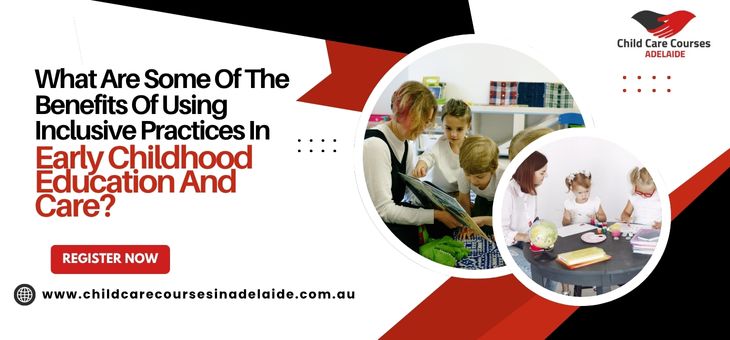Level 1 East 50 Grenfell St,
Adelaide SA 5000

Early education in Australia is growing and inviting trainers or educators from worldwide to deliver inclusive practices for developing children’s emotional, mental, and physical aspects with equality. But what does “inclusive” mean in early education? Well, it is all about strategies, approaches, and environments that welcome, value, and support the diverse needs, abilities, and backgrounds of all children, families, and staff.
In this article, you will learn about the benefits of inclusive practices for early childhood education with other details.
When a kid goes to a school environment for the first time, they are sure to feel nervous and hesitant. But it is a childcare educator who makes them feel emotionally, mentally, and socially connected with an inclusive approach and care. This means creating an environment where all children feel valued, respected, and supported, regardless of their-
You can well understand with an example like a child who comes with disabilities, the preschool classroom should have wheelchair accessibility, and the educator must ensure that those kids are involved in activities and the learning framework to feel valued at school.
Giving quality early education to the kids is the best way to increase confidence level and learning capabilities, helping children with overall development. By using inclusive practices, you can help children see themselves reflected in the curriculum and materials, and they are more likely to feel confident and engaged in the learning process.
Early childhood education is the stage of getting basic skills related to personal hygiene, daily routine, and emotional support. With inclusive practices, you can prepare kids for an increasingly diverse and globalized world, teaching them to appreciate and respect differences.
From a parent’s lap, children come to preschool, and being early childhood educators, your responsibility is to make them familiar with society. This is done through inclusive environments that encourage children to interact with peers from diverse backgrounds, promoting social skills, empathy, and understanding.
Children are born with innocence, and it is your duty to make them feel connected and happy in a preschool environment. Inclusive practices help children feel valued, respected, and included, which promotes a sense of belonging and self-worth.
Inclusive practice not only benefits children but is ideal for early educators for personal and professional growth. With early childhood courses, you get skills and knowledge about diverse cultures, abilities, and experiences. This helps you broaden your understanding and become more efficient teachers, leading to improved educational outcomes.
Not every job gives satisfaction, but by pursuing an early childhood education, you easily get job fulfillment with better earnings. By creating inclusive environments, you can bring educators a sense of satisfaction and purpose, as they see students thrive and feel valued.
Being an early childhood trainer, if you are using Inclusive practices, it will bring new ideas and approaches into the classroom, enriching the learning environment and helping educators stay innovative, and helping you work professionally in childcare settings.
Early childhood education is all about teaching young minds with basics of daily routine, alphabet, and sitting or standing. Prioritizing inclusion will make a positive and supportive classroom environment, promoting social skills, empathy, and academic success.
For families and teachers, it is important to stay connected with each other to know a child’s emotional and mental behavior. Inclusive practices easily help to build trust and partnership between families and educators, leading to stronger, more supportive relationships.
When families feel welcome and included, they get satisfaction that their child is being learned and motivated. With an inclusive approach, parents and educators are more likely to participate in their child’s education, feeling more connected and invested.
When children from diverse backgrounds come, educators and parents are likely to share their culture, beliefs, and understanding about society and children. With Inclusive environments, you provide opportunities for families to share their cultures, traditions, and experiences, enriching the community and promoting understanding.
Early childhood education goes hand in hand with creating a supportive network with kids and families. By using inclusive practices, you can create a support network for families, providing a sense of community and connection with others who share similar experiences and values.
Using inclusive practices in early childhood education helps to enrich children’s minds and aids in overall development. These skills and knowledge are gained by pursuing an early childhood education and care where you teach, mentor, and guide every kid without any differentiation. On the completion of this course from one of the best Child Care Courses Adelaide, you are equipped with the required framework to teach and mentor kids and staff coming from diverse backgrounds or characteristics. This will ultimately lead to a better education system and build a stronger community.